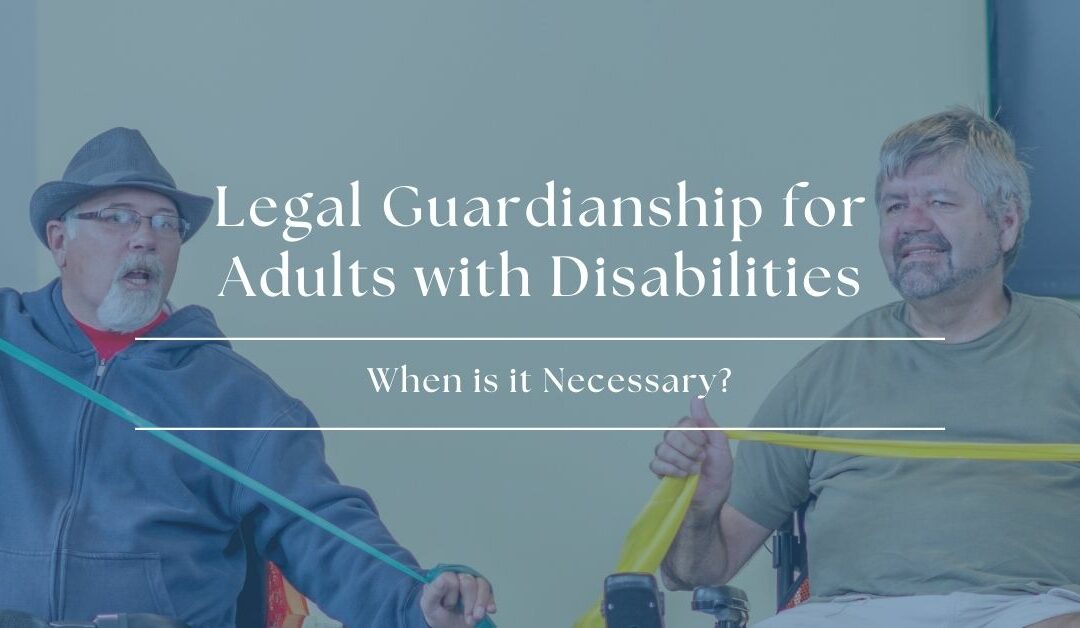If you have a loved one struggling with daily challenges that limit their ability to care for themselves, they may need a legal guardian. A legal guardian can help in a limited or more hands-on capacity depending on the situation. This article will look at when legal guardianship for adults with disabilities is necessary and how to petition the court.
When is Legal Guardianship Necessary?
If your loved one struggles to care for themselves daily, they may need help. However, individuals with disabilities also have the right to live independent lives. According to Disability Rights NC (DRNC), individuals with disabilities have these rights:
- Live in the community of your choice
- Have equal access to services, employment, housing, and education in that community
- Live an independent and integrated life
- Be free to make choices about how you live
- Be safe in your community (including prevention of abuse and neglect in institutions and facilities)
- Prepare for and recover from natural disasters
When Is Guardianship Beneficial?
Guardianship can be beneficial for those who need assistance in making decisions or telling others what they want. Guardianship may be suitable for persons who can’t make their own decisions or tell others what they want. If a disabled individual would benefit more from someone else making decisions for them, then guardianship may be appropriate for making decisions such as:
- Caregiving
- Healthcare
- Finances
- Living arrangements
However, a person who can make their own decisions often can manage their own life with help from a resource such as Disability Rights NC. DRNC advocates for persons with disabilities to have the right and chance to live their life as they want.
Types of Guardianship
There are different types of guardianship, each with its own legal requirements. A court appoints a type of guardianship based on the disabled person’s needs that may include:
- Personal needs (such as healthcare)
- Property (such as managing finances)
- Both personal and property matters
A legal guardian can make decisions on behalf of the person with a disability. The guardian must act in the best interest of the disabled individual and follow any court orders that are in place.
Depending on the situation, a legal guardian can help in a limited or more hands-on capacity. They may be responsible for making healthcare decisions, managing finances, or both. In some cases, the legal guardian may also have authority over where the person with a disability lives and other significant decisions. It’s essential to discuss all options with an attorney before petitioning for legal guardianship.
Alternatives to Guardianship
When you petition for guardianship and go through the process of attempting to prove a person needs a guardian, the court will consider the needs of the individual in question and limit the guardianship to what is necessary.
The courts select only the level of guardianship that someone needs. The judge understands the gravity of removing someone’s freedom to live independently or make their own decisions.
Instead of petitioning for guardianship, you may want to look at ways to help the individual live well while keeping their freedoms intact. Consider these ways to help a disabled individual live on their own before petitioning for guardianship:
- Powers of attorney (legal documents that give decision-making powers to someone else in case of incompetence. Since the disabled person selects this person, there is trust that the person will only use the powers if needed.)
- Joint bank accounts
- Special Needs Trusts
- Community or family support
Petitioning for Guardianship
If you’ve realized that your loved one needs help making decisions and that legal or community resources and advocates are not enough, you will need to gather proof of incompetence. The proof may include medical records, doctor or counselor statements of the person’s incompetence, evidence of their inability to care for or advocate for themselves, and much more.
Next, you must file the petition with the court and wait for your hearing date. At the hearing, the judge will decide whether or not to appoint a legal guardian for your loved one.
Guardianship Hearings
A guardianship hearing is a legal court hearing often requiring testimonies, witnesses, legal statements from medical professionals, and more. Generally, working with an experienced guardianship attorney will bring the best outcome.
Because of the need for knowledge of civil procedure and legal processes, it’s best to have counsel on your side to understand the process and what to expect.
We Can Help
If you need help with any guardianship issue, we are here to help. Our experienced guardianship attorneys can advise you about whether your loved one needs guardianship and how to advocate on their behalf. We work with you to assess the best outcome for your unique situation and help you draw up any legal documents that may help, such as a power of attorney or healthcare advance directives.
We understand the need for individual autonomy and also recognize that some individuals need guardianship for their best life. Contact us for an initial consultation and find out more about how we can help.

